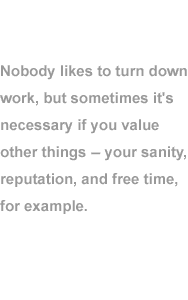 |
|
||||||||||||
 |
|
||||||||||||

|

|
|
By Janice Brand
|
It was the favored slogan of a certain ex-president's wife. It was the futile phrase of your high school sex education teacher. It's the rallying cry of the religious right. Just say no. We can't help you with decisions about drugs and sex (not yet) but we do know of ways to turn down work and live to earn again. There are several reasons why you might want to decline a project, but most often they have to do with time management conflicts. Or some sort of twisted corollary to Murphy's Law: Why do Company A and Company B both call with immense projects on the same day, when you've been sitting idle for three months? It happens, and often there's no way you can manage both jobs. The secret is saying no gracefully and gainfully. Get Exclusive Jay White says it's never easy to turn away work. "If you're good," he says, "you get into having to say no eventually. It depends what your threshold of pain is." White, an IP based in Minneapolis, Minn., has written direct-mail packages for 21 years. He's not only learned to say no, he's figured out how to make himself look good while delivering the bad news. "You tell them you're booked," he says. This gives the impression that your services are in high demand and therefore valuable. "I tell a client I book three to six months in advance, and they go 'holy moley-- he must be good!'" By stating up front what his planning needs are, White gains respect, if not always jobs. "You do lose [work] when you say no," he says. "It depends on what you want: long-term relationships or one-night stands. Clients understand that." Even a seasoned pro like White sometimes takes on more than he should, fully aware that "it's no fun." He admits that "the greed factor kicks in. I still get into that situation. I say yes and my wife looks at me like, 'Who are you?' If you take on too much and fail to meet the deadline, you might lose the client." Get a Network For Sue Losapio, the IP proprietor of Losapio Training & Consulting, in Hampton, N.H., the secret to turning down work is being able to refer the client to a trusted colleague. "If I get a call and I'm booked on that day, I refer the client to one of my colleagues who I consider more than capable of taking and honoring the assignment," says Losapio. "These are people in the same business, who work similar to the way I work, use some of the same tools, and have the same base philosophy." Some IPs might worry that they would lose potential clients forever by referring them to other professionals. What goes around typically comes around, though, especially within a tight and supportive network of colleagues. The client, moreover, will appreciate and remember the service, and will probably mention your helpfulness to friends. Losapio says that she ends up looking better herself when she makes a good referral. "I got a call from a client who wanted me to do an hour-and-a half presentation for their annual meeting-- a rah-rah type of thing. But I was going to be on vacation that week. So I found out specifically what the client wanted, then I found other people to refer [the client] to. The woman they hired did an awesome job-- and made me look good, too." Losapio has built up her management and sales training business over the past five years. In the beginning, she didn't exactly have the problem of having to turn down work. The problem then was getting any work at all. "When you're trying to develop what you're really about," she says, "you have to go through that courtship phase." When Losapio turns away work now, it tends to be from existing clients, who are already comfortable with her work and will want to use her again, even if they have to wait for an opening in her schedule. With new clients, however-- people she has yet to win over and are likely to look elsewhere if she's not immediately available-- "I will find some way to fit them in," she says. New clients tend to call with future requests anyway, she says, not last-minute needs, and are therefore easier to accommodate. Still, Losapio remains firm about saying no when she has to. If you take on
work that you can't handle, she says, "that doesn't help anybody." |
||||
| |||||
|
August 13, 1999 Edited by Eric Gershon Illustration by Lawrence San Production by Keith Gendel |
We'd love to hear your comments about this article! Janice Brand is a freelance writer who lives in Charlestown, Mass. If you like, we'd be happy to put you in touch with her, or with any of the other IPs named in this article. | ||||
| |||||